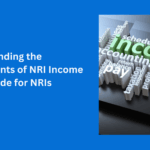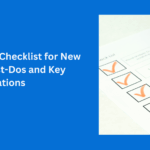Becoming a Non-Resident Indian (NRI) opens up new opportunities but also comes with specific responsibilities. From managing your finances to handling investments, tax filing, and ensuring legal compliance, there are several important steps to follow when moving abroad. This Essential Checklist for New NRIs outlines the critical actions you need to take before and after leaving India, ensuring that your financial and legal affairs are well-managed and compliant as an NRI.
Before Leaving India: Essential Steps to Take
- Apply for Aadhaar Card
An Aadhaar card may be required for certain investments in India. Ensure it’s linked to your mobile for OTP verification. - Streamline Your Bank Accounts for Online Services
Make sure your bank account offers NRI services and is linked to mobile banking for easy access and management from abroad. - Open a Public Provident Fund (PPF) Account
NRIs cannot open new PPF accounts, but existing accounts can remain active, allowing for contributions and subsequent transfers to an NRO account on maturity. - Appoint a Power of Attorney (POA)
Designate a trusted person to handle property transactions, legal matters, and more while you’re abroad. POA for property transactions in India can save time and effort. - Manage Property in India
Look into property management services or platforms like Magicbricks or Nestaway to ensure smooth rental and maintenance processes while living abroad.
After Settling as an NRI: Key Tasks to Complete
- Update Your KYC and FATCA Details
Update your KYC information with Indian banks and ensure compliance with FATCA regulations for transparency in financial dealings. - Set Up UPI for Easy Transactions
Enable UPI for seamless payments for utility bills, investments, or remittances to India, making financial management hassle-free. - Convert Your Resident Indian Savings Account to an NRO Account
Changing your residential status requires converting your savings account to an NRO account to avoid penalties. - Open an NRE Account
An NRE (Non-Resident External) account allows tax-free interest on savings in India while helping to repatriate funds easily. - Open a Portfolio Investment Scheme (PIS) Account
A PIS account is required if you plan to invest in Indian securities like stocks and bonds, ensuring compliance with Indian financial regulations. - Start Mutual Fund Investments
NRIs can invest in Indian mutual funds after completing their KYC process. Link these investments to your NRO account for ease of transactions. - Apply for an NRI Credit Card
Consider getting an NRI credit card, which typically requires a fixed deposit as collateral. - Consider Health Insurance Abroad
Invest in international health insurance to cover medical expenses while abroad. - Check Passport Validity
Ensure that your passport is valid for at least six months from your departure date and renew it if necessary.
Conclusion
Transitioning to NRI status brings both opportunities and challenges. Following this checklist will help you navigate the complexities of managing your finances, legal matters, and compliance obligations. With a proactive approach to banking, investments, and documentation, you can ensure a smooth and hassle-free experience as an NRI.
At NRI Edge, we specialize in offering tailored assistance for NRIs to manage their finances and legal responsibilities efficiently. Our team is here to guide you through tax planning, property management, and investment strategies to ensure your financial success abroad.
Frequently Asked Questions (FAQs)
- Is Aadhaar mandatory for NRIs?
While Aadhaar is not mandatory, it is useful for KYC and investment processes, simplifying your interactions with Indian financial institutions. - How do I check my NRI status in India?
If you have stayed in India for less than 182 days in a financial year or 60 days in the current year, you qualify as an NRI. - Do I need to declare NRI status?
Yes, updating your status is crucial for tax filings, opening NRI bank accounts, and availing of DTAA benefits. - How can I convert my PAN card to NRI status?
You can update your residential status on the Income Tax portal, which will reflect your NRI status.






